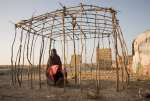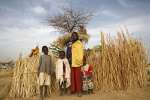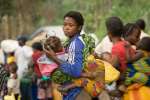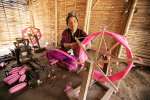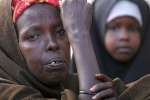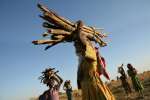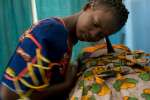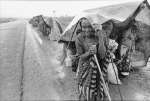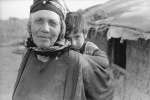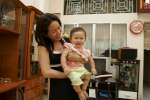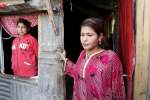- Text size
 |
|  |
|  |
| 
- Français
16 Days of Activism: Fathers urged to act as role models in Montenegro
News Stories, 4 December 2008

PODGORICA, Montenegro, December 4 (UNHCR) – A coalition of interested parties in Montenegro is marking a global campaign against sexual and gender-based violence (SGBV) by encouraging fathers and father figures to set an example to young males.
The Montenegrin initiative was launched by the UN refugee agency and partners to coincide with the annual 16 Days of Activism to Eliminate Violence Against Women, an international campaign originating from the first Women's Global Leadership Institute in 1991. The 16 days began on November 25.
The father project, drawing on material provided by the United States-based Family Violence Prevention Fund, has been developed and funded by UNHCR, sister UN agencies, the Montenegrin government, the Organization for Security and Cooperation in Europe (OSCE), the Fund for an Open Society and popular local sport coaches, Petar Porobic and Igor Kolakovic
In the deeply patriarchal Montenegrin society, the campaign calls upon fathers and father figures, including teachers, mentors, uncles, older brothers and sports coaches to lead by example and teach boys that all forms of violence against women are wrong. It emphasizes the importance of the father as a role model to the son.
Some 10,000 campaign posters have been distributed in schools, health centres and social welfare centres around the country. Several sports associations are supporting the campaign, with players wearing campaign T-shirts before matches. Billboards broadcast the messages of tolerance and respect, while TV and radio spots are being aired for free.
"Every human being, regardless of gender, race or religion, is equally important on this planet and each one of them deserves to be respected," said Kolakovic, one of the country's top volleyball coaches. "The kind of violence that deserves particular condemnation, and which should be opposed through concerted action, is domestic violence against women and children."
He urged Montenegrin men "to teach your sons that being a real man means to respect and esteem women, and that being strong does not mean being a bully. You are their role model. They will listen to you. The power of change is in our hands," added Kolakovic, who has two sons.
"Never before has a campaign in Montenegro called so directly upon men to challenge the deeply rooted belief in their superiority and their right to control the lives of their women," said Serge Ducasse, UNHCR's representative in Montenegro. "Fathers [and father figures] have to speak out and teach their sons that violence is never an expression of strength but one of cowardice."
Violence against women is a serious problem in Montenegro. A recent European Commission report said that one in two women in Montenegro was a victim of verbal abuse, while one in three women was a victim of physical abuse. The number of reported cases of domestic violence against women rose by 7.3 percent in 2008 compared to 2007, the report revealed.
"Making abusive or potentially abusive fathers understand the trauma that domestic violence has on their children can be a strong motivator for some men to change their behaviour," said Sara Fewer, a programme specialist for the Family Violence Prevention Fund.
"Many men are able to develop empathy towards their children more easily than towards their partners. Giving fathers more opportunities for change and healing is an essential component to end violence against women and children."
By Gordana Popovic in Podgorica, Montenegro
Related stories by:
- Refugee and sexual violence survivor restores hope in Rwanda
- UNHCR warns of "looming refugee crisis" in the Americas
- UNHCR applauds Austria and Germany as refugees march across Hungary
- UNHCR chief issues key guidelines for dealing with Europe's refugee crisis
- UNHCR chief Guterres stresses need to fight human trafficking, protect victims
UNHCR country pages
How UNHCR Helps Women
By ensuring participation in decision-making and strengthening their self-reliance.
UNHCR's Dialogues with Refugee Women
Progress report on implementation of recommendations.
Women
Women and girls can be especially vulnerable to abuse in mass displacement situations.
Handbooks
Follow us on Twitter
Advocacy
Advocacy is a key element in UNHCR activities to protect people of concern.
Civil Registration and the Prevention of Statelessness: A Survey of Roma, Ashkaelia and Egyptians (RAE) in Montenegro
Results of a study carried out in 2008 by UNHCR, with support from the European Commission and UNICEF, May 2009.
Women in Exile
In any displaced population, approximately 50 percent of the uprooted people are women and girls. Stripped of the protection of their homes, their government and sometimes their family structure, females are particularly vulnerable. They face the rigours of long journeys into exile, official harassment or indifference and frequent sexual abuse, even after reaching an apparent place of safety. Women must cope with these threats while being nurse, teacher, breadwinner and physical protector of their families. In the last few years, UNHCR has developed a series of special programmes to ensure women have equal access to protection, basic goods and services as they attempt to rebuild their lives.
On International Women's Day UNHCR highlights, through images from around the world, the difficulties faced by displaced women, along with their strength and resilience.
Women in Exile
Refugee Women
Women and girls make up about 50 percent of the world's refugee population, and they are clearly the most vulnerable. At the same time, it is the women who carry out the crucial tasks in refugee camps – caring for their children, participating in self-development projects, and keeping their uprooted families together.
To honour them and to draw attention to their plight, the High Commissioner for Refugees decided to dedicate World Refugee Day on June 20, 2002, to women refugees.
The photographs in this gallery show some of the many roles uprooted women play around the world. They vividly portray a wide range of emotions, from the determination of Macedonian mothers taking their children home from Kosovo and the hope of Sierra Leonean girls in a Guinean camp, to the tears of joy from two reunited sisters. Most importantly, they bring to life the tremendous human dignity and courage of women refugees even in the most difficult of circumstances.
Refugee Women
Statelessness and Women
Statelessness can arise when citizenship laws do not treat men and women equally. Statelessness bars people from rights that most people take for granted such as getting a job, buying a house, travelling, opening a bank account, getting an education, accessing health care. It can even lead to detention.
In some countries, nationality laws do not allow mothers to confer nationality to their children on an equal basis as fathers and this creates the risk that these children will be left stateless. In others, women cannot acquire, change or retain their nationality on an equal basis as men. More than 40 countries still discriminate against women with respect to these elements.
Fortunately, there is a growing trend for states to remedy gender discrimination in their nationality laws, as a result of developments in international human rights law and helped by vigorous advocacy from women's rights groups. The women and children depicted here have faced problems over nationality.
Statelessness and Women


2015 World Day against Trafficking in Persons: ICAT Video Statement
The second annual World Day against Trafficking in Persons is being marked on 30 July 2015. To mark this special day, the Principals of eight of the world's key organizations working to tackle this crime have come together to issue a special statement. Together, these eight heads of organizations are urging more to be done to help the millions of women, men and children who fall victim to one of today's most brutal crimes, and to join forces to improve trafficked persons' access to remedies that respond to their individual needs. This video includes statements from the following members of the Inter-Agency Coordination Group against Trafficking in Persons (ICAT): ILO, INTERPOL, IOM, OHCHR, UN Women, UNHCR, UNICRI and UNODC.


Colombia: Helena Christensen gets to know Maribeth for World Refugee Day 2015
The Danish photographer visited UNHCR's work in Colombia and met with women who show great strength and courage in one of the world's most protracted conflict-ridden hot spots.


